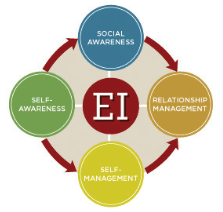Emotional intelligence means recognising one’s own feelings and understanding the feelings of others. It also means that we can distinguish and name various emotional states. A person who is aware of their feelings will be able to describe how they feel, what is causing these feelings and, finally, they will be able to regulate and evaluate their emotional states. People with well-developed emotional intelligence use the information about their feelings to help them in their thinking and behaviour. Therefore, a person who can identify and regulate their feelings will be able to constructively focus their thoughts and actions. These skills are critical for emotional well-being and success in life.
Characteristics of a person with well-developed emotional intelligence
People with well-developed emotional intelligence are sociable and theywant to meet new people; they are good leaders because they can listen and can also take constructive criticism; they are respectful, and principled in their relations to co-workers. They quickly detect the mood of others and better judge the character of other people. They also know their strengths and weaknesses. They know when they are hurt in a relationship and why. They know how to say no. They are clear in their communication and get along with most people. To them, morality and ethics are always important.
Dimensions in the learning process of emotional intelligence
There are four main dimensions of the »emotional mind« that are essential for learning emotional intelligence. There are two personal skills: Self-awareness and Self-management and two social skills: Social awareness and Relationship management.

Source: (http://www.teleosleaders.com/howwedoit/emotional.php)
Each of these dimensions comprises many abilities, skills, qualities and virtues that a person can develop in professional or family life.
Self-awareness. In the context of understanding emotional intelligence, this means the ability to be in tune with one’s own feelings. A person who is in touch with their emotions understands and knows how to interpret their own feelings and how to use them in relationships. Connected with emotional awareness is also situational awareness which will be more broadly described later on.
Self-management. This means the ability to regulate one’s own emotions, impulses and behaviour. A person is capable of controlling and acting in a professional and calm manner, even in stressful situations. An individual who can manage his/her own behaviour is more focused on the task at hand rather than with trivialities. Capabilities within this category are achievement orientation, adaptability, a positive outlook and emotional self-control.
Social awareness. The ability to sense, read, understand and evaluate other people’s emotions and how they impact on a certain situation. A person with a developed social awareness has capabilities such as empathy, understanding the dynamic of interpersonal relations, and organisational awareness.
Relationship management. This last dimension includes various skills and capabilities that a person has to master if they want to be an efficient relationship manager. The person has to know how to manage, influence and accept the feelings of other people. They have to be an excellent conflict solver. With these abilities a person can work as an inspiring leader, coach, mentor and a successful manager of a group or organisation.
Strategies for building emotional and social effectiveness
Skill 1: Valuing self
Healthy self-talk
Skill 2: Valuing others
Acknowledge others
Enhance awareness of diversity in other people
Skill 3: Responsive awareness
Observe and practise empathy
Skill 4: Courage
Skill 5: Authentic success
Connecting values and expectations
Without this awareness, our emotions will dictate our actions and in the middle of a crisis we (or volunteers, helpšers,..) need to use the part of the brain that allows rational thinking, not the part of the brain where emotions are experienced. Practice being calm and in control, and be aware of our reactions to challenging situations is crucial in any difficult sitiation, especially in the times of crisis when it is important how successfully we can face other life trials. In order for individuals to empower themselves and others they encounter in their activities, the skill of emotional intelligence is of paramount importance.
The reason emotional intelligence is so important when dealing with difficult situations is that an emotionally intelligent person will respond to adversity in a calm, considered way. The emotionally intelligent perswon is better at managing emotions—both their own and those of others—during times of stress or pressure.